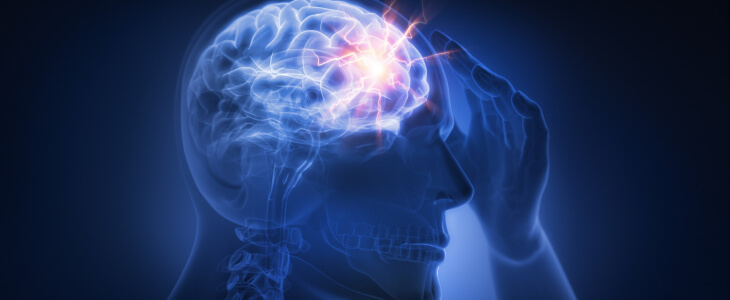At Long Island Spine Rehabilitation Medicine, our reputation for successfully treating injuries, including concussions, brings patients from all over Nassau and Suffolk Counties to our five conveniently located offices. Our doctors are physiatrists, doctors who specialize in pain relief and restoration of function. We are committed to treating each patient as a whole human being, not a conglomeration of symptoms.
Our physicians are highly skilled when it comes to providing nonsurgical, holistic healing through a broad range of traditional and complementary treatments. If you have sustained a head injury and believe you may have suffered a concussion, contact us for prompt evaluation and treatment. Because we understand the inherent connection between mind and body, we will pay close attention to your reportage of symptoms and your preferred therapeutic methods, tailoring our treatment to meet your particular needs.
Defining Concussion
A concussion is a type of traumatic brain injury (TBI) that occurs when a blow or jolt to the head leads to a temporary disruption in normal brain function. This condition can affect memory, judgment, reflexes, speech, balance, and muscle coordination. Given the serious nature of this type of injury, understanding its mechanisms, symptoms, and treatments is critical for patients and doctors alike.
Concussions can occur as a result of car accidents, construction accidents, slip and falls, assaults, playful roughhousing, or sports mishaps. Sports concussions are more likely to happen in contact sports such as football, soccer, hockey, rugby, and basketball.
During a concussion, the brain slides back and forth against the inner walls of the skull. This forceful movement can be caused by a violent blow to the head and neck or upper body, as occurs during a collision with a person, vehicle, or object. It may also be caused by the sudden acceleration or deceleration of the head during a quick motion.
Symptoms of Concussions
Symptoms of concussions vary widely among individuals but commonly include some combination of the following:
- Headache, dizziness, vertigo
- Nausea and/or vomiting
- Ringing in the ears
- Confusion or mental “fog”
- Visual disturbances (blurred vision, “seeing stars”)
- Balance problems
- Memory loss (amnesia)
- Forgetfulness (delayed response to questions)
- Sensitivity to light or sound
- Drowsiness or fatigue
- Temporary loss of consciousness
- Slurred speech
The symptoms of a concussion can be subtle or delayed, and can last for days, weeks, or even longer. Symptoms that may occur in the days or weeks after a concussion include:
- Trouble with concentration and memory
- Irritability, depression, and other personality changes
- Trouble sleeping
- Changes in taste and smell
How LISRM Doctors Diagnose and Evaluate Concussions
Whatever the cause of a concussion, it must be diagnosed through a thorough physical and neurological examination. In order to diagnose and evaluate the severity of a concussion, our doctors must carefully assess the patient’s mental status, balance, coordination, and reflexes, and ask questions to evaluate memory and ability to concentrate. In some cases, imaging tests like MRI or CT scans are necessary to rule out more severe injuries.
A neurological exam may be required to properly evaluate brain function and determine the extent of the damage. Fortunately, our physiatrists are board-certified in electrodiagnostic medicine and board-eligible in neuromuscular medicine, so they are well-qualified to administer such tests.
Potential Complications of Concussions
If not properly treated, sports concussions can lead to long-term complications, including chronic traumatic encephalopathy (CTE), prolonged cognitive impairment, and an increased risk of subsequent concussions. Sometimes, even a seemingly mild traumatic brain injury can lead to bleeding in or around the brain, causing prolonged drowsiness, confusion, or even death. This is why early and effective treatment to minimize the risk of complications is crucial.
Long Island Spine Rehabilitation Medicine’s Treatments for Concussions
At Long Island Spine Rehabilitation Medicine, rest and physical rehabilitation are always central to our treatment since both are necessary to help the brain heal and to restore balance and coordination. We also employ complementary therapies such as acupuncture, which has shown promise in alleviating post-concussion symptoms.
For the disturbing headaches frequently suffered by concussion patients, we recommend acetaminophen (Tylenol) for pain relief. It should be noted that aspirin or ibuprofen (Advil) should be avoided in the immediate aftermath of a concussion because these medications can cause bleeding. Other medications sometimes utilized for long-term aftereffects of concussions include anti-nausea drugs, Gabapentin for mood disorders, tricyclic antidepressants (TCAs), and anti-nausea drugs.
Above all, recovering from a concussion requires patience. The process cannot be rushed, so it is essential that doctor and patient work together to gradually move the patient forward in accord with careful monitoring. Patients must practice caution since engaging in activities that overtax the brain may exacerbate symptoms, delay healing, and generally make matters worse.
During the first days after a concussion, you may find simple activities, like reading, watching TV, playing video games, doing school or office work, texting, or using a computer, difficult or uncomfortable. This is to be expected. Resting and relaxing are vital to helping you heal. You should only gradually begin resuming normal activities, always under the guidance of your physician because engaging in vigorous activity too soon can interfere with recovery.
Get in Touch With Our Experienced Concussion Specialists Now
The importance of recognizing and properly treating concussions cannot be overstated. Early intervention is key to a successful recovery, and our team is here to support you. Contact Long Island Spine Rehabilitation Medicine today to learn more about how we can help you return to health by addressing not only your physical symptoms but also the emotional toll your concussion has taken on your sense of safety and well-being.
